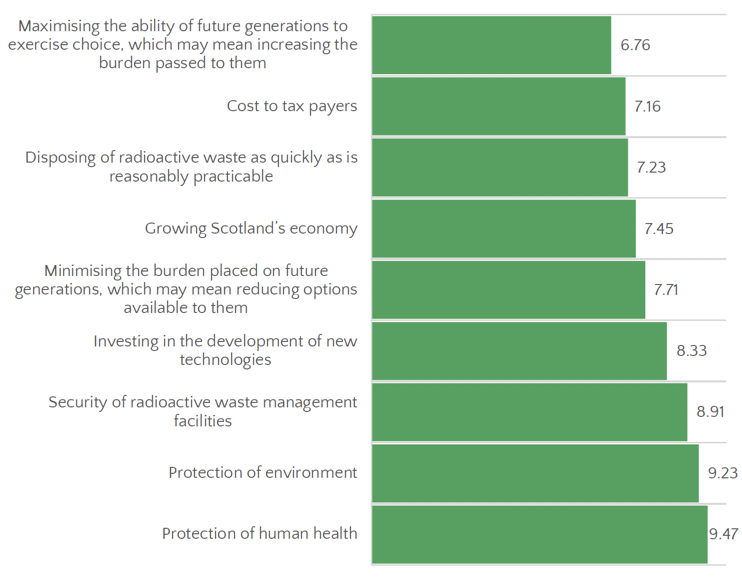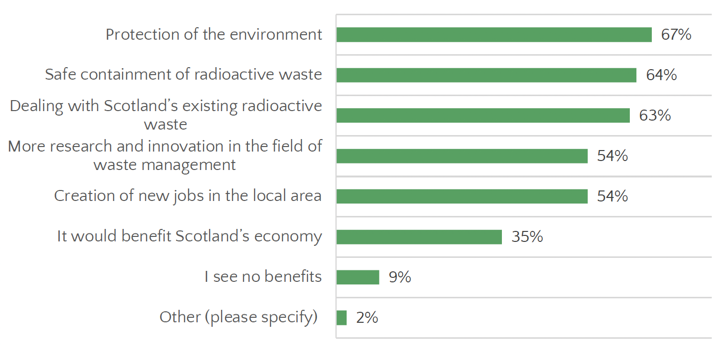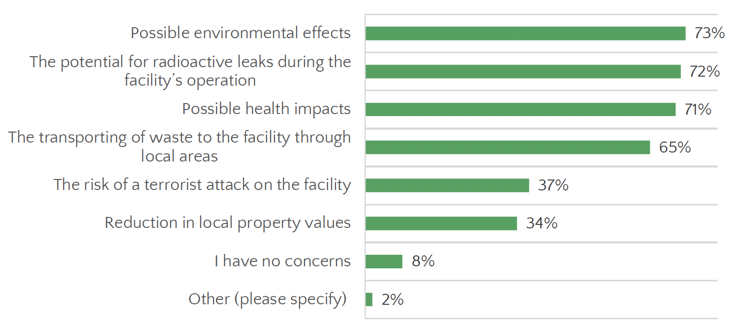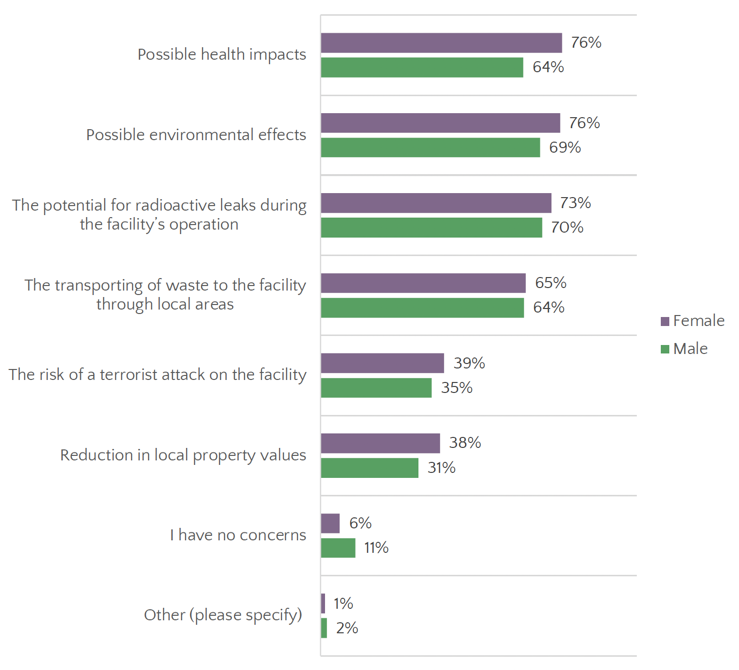Radioactive Waste Management - Public Attitudes Survey for Scotland
This report summarises findings from a representative survey of the Scottish public that provides new insights into the perceptions and views towards radioactive waste management in Scotland.
Chapter 4: Priorities in radioactive waste management
This section explores the public's priorities in managing radioactive waste. This includes benefits and concerns the public hold on new disposal facilities in Scotland.
4.1 Priorities in radioactive waste management
The public was asked about how important they believe a series of aspects are to the managing of radioactive waste, on a scale from 0, 'Not important at all', to 10, 'Extremely important' (Figure 4.1). Protection of human health emerged as the top priority, with an average score of 9.47. Other top priorities included protection of the environment (9.23), security of radioactive waste management facilities (8.91), and investing in the development of new technologies (8.33).
However, all aspects queried were seen as relatively important in radioactive waste management, with the lowest element, 'maximising the ability of future generations to exercise choice, which may mean increasing the burden passed to them' receiving an average of 6.76, signifying some importance overall. Notably, the cost to taxpayers also received a relatively lower ranking, with an average of 7.2, seen as important in general, but less so compared to other aspects of radioactive waste management.
When considering the impact of radioactive waste management on future generations, there was a preference for present-day decision makers to take action. The statement 'minimise the burden placed on future generations, which may mean foreclosing options available to them', achieved a mean of 7.71. This is one point more than the statement 'maximising the ability of future generations to exercise choice, which may mean increasing the burden passed to them', 6.76.

Base: All (2,155)
4.2 Impacts of new facilities to dispose of radioactive waste
In general, respondents believed there would be some benefits to Scotland from new facilities for managing radioactive waste (Figure 4.2). About two in three selected that new radioactive waste management facilities would add to the protection of the environment (67%), safe containment of radioactive waste (64%), and deal with Scotland's existing radioactive waste (63%). Respondents seemed more sceptical about the economic benefits of new facilities for radioactive waste management in Scotland, with about half (54%) of the view that new facilities would lead to the creation of new jobs in the local area and about one in three (35%) selecting that new facilities would benefit Scotland's economy.
Less than one in ten said that they see no benefits from new facilities for managing radioactive waste in Scotland (9%).

Base: All (2,160)
The other (please specify) option was used by 52 respondents to share that they either don't know what the benefits of a new facility would be or that they don't feel there would be any benefits of a new facility, e.g.: "no benefits, it's deadly".
Indeed, many used the opportunity to discuss their concerns about new facilities. Those respondents who did not perceive any benefits of a new facility were concerned about Scotland being used to store radioactive waste created elsewhere:
"I do not want Scotland to become a dumping ground for everyone`s waste".
"Scotland should not be taking nuclear waste from other countries. If another country has imposed nuclear sites on Scotland e.g., England then the waste should be taken back to that country and they should have to deal with it or dealing with other countries radioactive waste – also managing waste should be a devolved area".
Respondents were asked explicitly about the concerns they have about new facilities for managing radioactive waste in Scotland (Figure 4.3). About seven in ten respondents report concern with possible environmental effects (73%), potential for radioactive leaks during the facility's operation (72%), and possible health impacts (71%). About one in three were concerned about the risk of a terrorist attack on the facility (37%) and a potential reduction in local property values (34%).
Less than one in ten said that they have no concerns with new facilities for radioactive waste management in Scotland (8%).

Base: All (2,160)
A total of 39 respondents gave comments at this other (please specify) option and as with the previous question, many used this facility to report that they don't know what concerns they had about new facilities for managing radioactive waste in Scotland.
Some were worried about "adverse economic impacts and disinvestment in areas", while others were worried about the funding for such facilities. In particular, concerns about a lack of funding and what consequences would arise in particular:
"Costs to taxpayers and governments (local and national), particularly long term costs"
"Corners being cut to cut costs"
Again, disposal of waste from other areas was raised as respondents don't want Scotland to "become a dumping ground for other countries waste".
Other issues raised include risks of wartime damage and the facility being the target of a terrorist attack.
More positively, some also used the comment box to state they had no concerns about new facilities for managing radioactive waste. However, they would want assurances that the systems are regulated.
"I don't have any concerns as long as the companies, staff and anyone involved directly or indirectly are properly vetted and regulated. The sites and transport are adequately protected and ran to the high standards required"
Looking at between-group differences, females were more likely than males to be concerned about the possible health impacts (76% vs 64% males) and environmental effects (76% vs 69% males) of new facilities for managing radioactive waste in Scotland. Females were also more likely than males to be concerned about the reduction in local property values (38% vs 31% males), however this was the least prevalent concern among the respondents.
In contrast, males were more likely than females to have no concerns about new facilities for managing radioactive waste in Scotland (11% vs 6% females).

Base: Male (1,041), Female (1,119)
Contact
There is a problem
Thanks for your feedback